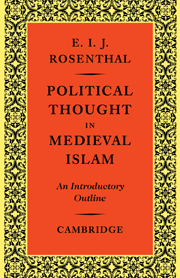Book contents
- Frontmatter
- Contents
- AUTHOR'S NOTE
- ABBREVIATIONS
- INTRODUCTION
- PART I CONSTITUTIONAL LAW AND MUSLIM HISTORY
- PART II THE PLATONIC LEGACY
- V POLITICAL PHILOSOPHY IN ISLAM
- VI AL FĀRĀBĪ: THE FOUNDATION
- VII IBN SĪNĀ: THE SYNTHESIS
- VIII IBN BĀJJA: INDIVIDUALIST DEVIATION
- IX IBN RUSHD: THE CONSUMMATION
- X AL-DAWWĀNĪ: APPLICATION AND INTEGRATION
- APPENDIX: SOME TURKISH VIEWS ON POLITICS
- NOTES
- GLOSSARY
- INDEX
VII - IBN SĪNĀ: THE SYNTHESIS
Published online by Cambridge University Press: 07 May 2010
- Frontmatter
- Contents
- AUTHOR'S NOTE
- ABBREVIATIONS
- INTRODUCTION
- PART I CONSTITUTIONAL LAW AND MUSLIM HISTORY
- PART II THE PLATONIC LEGACY
- V POLITICAL PHILOSOPHY IN ISLAM
- VI AL FĀRĀBĪ: THE FOUNDATION
- VII IBN SĪNĀ: THE SYNTHESIS
- VIII IBN BĀJJA: INDIVIDUALIST DEVIATION
- IX IBN RUSHD: THE CONSUMMATION
- X AL-DAWWĀNĪ: APPLICATION AND INTEGRATION
- APPENDIX: SOME TURKISH VIEWS ON POLITICS
- NOTES
- GLOSSARY
- INDEX
Summary
Law and lawgiver are of the greatest importance in political life. We saw this in the discussion which Al-Fārābī devotes to this question in relation to prophecy and to philosophy, the two primary qualifications demanded of the first ruler. The Muʿtazila had already stressed the necessity of a divinely revealed law to ensure the common weal (maṣlaḥa) of the Muslim state. The Falāsifa similarly insist on the political necessity and significance of the divine law. Al-Ghazālī attacks them as heretics and unbelievers because they reduced revelation to an act of emanation. The Active Intellect or Holy Spirit influences the human mind, conditioning its imaginative and intellectual faculties to receive a revelation in form of a law. This is the position of Al-Fārābī. It is also that of the Ikhwān al-ṣafāʾ (“Brethren of Purity”) and of Ibn Sīnā. The first simply reproduce almost word for word Al-Fārābī's 28th chapter of the Madīna fāḍila in their Encyclopedia, and their dependence on Al-Fārābī must therefore be assumed.
Ibn Sīnā, known to the West as Avicenna, did not write any political treatises of the kind we have discussed in the last chapter. He is concerned with human happiness and perfection, the highest stage of which consists in the contemplation of God, or Truth, and in mystical union with Him. It is in this context that man as a political being, a citizen, is considered.
- Type
- Chapter
- Information
- Political Thought in Medieval IslamAn Introductory Outline, pp. 143 - 157Publisher: Cambridge University PressPrint publication year: 1958



